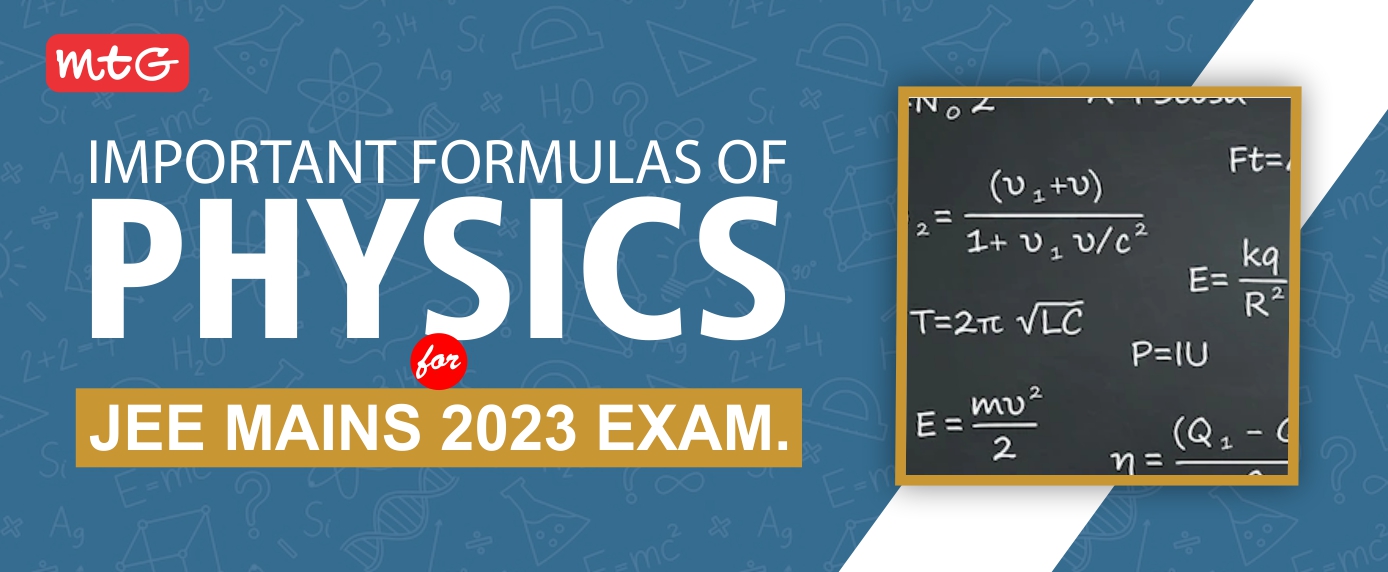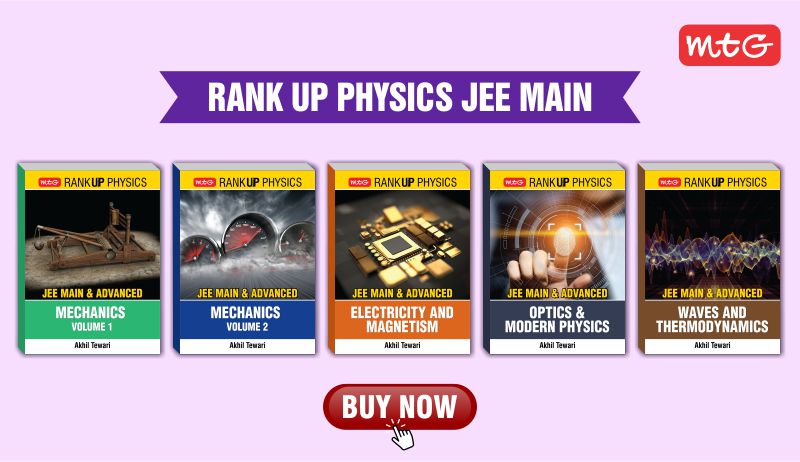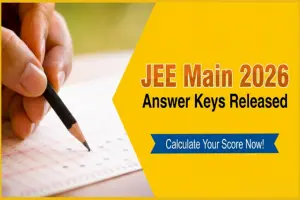
Amongst all the other things, knowing and remembering the most important physics formulas for JEE exams is very crucial. JEE Main exam preparation is complex because it is one of the most difficult competitive exams in the world. Remembering all of the important formulas from the entire syllabus is a crucial part of JEE preparation because some problems will require you to apply the formulas directly to get the answers. Thus, we’ve developed a list of important formulas for JEE Physics topics to make things easier. Here you will discover several effective methods for learning formulas for physics in JEE exam. Moreover, you can also check out the best books for JEE Main Exam preparation and tips by JEE toppers to crack JEE Main in the first attempt by us.
Recent – JEE Mains Physics Chapter Wise Questions With Solutions
Important: JEE Mains Previous Year Question Papers – Free PDF Download
Also Check out: 30 Days JEE Main Planner to Boost Your JEE Main Preparation
Practice from – JEE Main Sample Papers With Answers: FREE PDF Download
Important Formulas for JEE Main Physics
The JEE Main Physics section is regarded as a difficult section. However, the JEE Main Physics syllabus should be studied thoroughly. Candidates preparing for the JEE Main exam regard Physics as the most difficult section due to the lengthy derivations. Let’s look at some key formulas for JEE Main that will aid in effective physics preparation.
- Electric Charge : Q = ± ne (e = 1.60218 × 10-29 C)
- SI unit of Electric Charge is Coulomb (C)
- The energy of electric dipole is given by U = – p.E.
- The energy of a magnetic dipole is U = – μ .B C.
- Coulomb’s Law : Electrostatic Force (F) = k[q1q2/r2] and,
- In Vector Form :
→F=k(q1q2)×→r/r3
Where, q1 and q2 = Charges on the Particle,
r = Separation between them,
→r = Position Vector,
k = Constant = 14πϵ0=8.98755×109Nm2C2
Recommended – Best Books for JEE Exam Preparation
- Average current density:
→j=Δi/Δs
j=limΔs→0 Δi/Δs=di/dS ,
j=Δi/ΔScosθ
Where, Δ S = Small Area,
Δ i = Current through the Area Δ S,
P = Perpendicular to the flow of Charges,
θ = Angle Between the normal to the Area and the direction of the current.
- Electric Current :
The current at Time t : i=limΔt→0 ΔQ/Δt= dQ/dT
Where Δ Q and Δ T = Charges crosses an Area in time Δ T
SI unit of Current is Ampere (A) and 1A = 1 C/s
- Kirchhoff’s Law:
Law of Conservation of Charge: I3 = I1 + I2
Laws Of Gravity: Important Physics Formulas For JEE Main
| Universal Law of Gravitation: | Gravitational force →F=G[Mm/r2]^r Where, M and m = Mass of two Objects, r = separation between the objects, ^r = unit vector joining two objects, G = Universal Gravitational Constant [G=6.67×10−11N⋅m2/Kg2] |
| Kinetic Friction: | fk = µk · N Maximum Static Friction (Limiting Friction): fmax = µs · N, Where, N = Normal Force, µk = Coefficient of Kinetic Friction, µs = Coefficient of Static Friction. |
| Work Done by Constant Force: | Work Done (W) = →F⋅→S=∣→F∣ ∣→S∣ cosθ, Where, S = Displacement along a straight line, F = applied force, θ = Angle between S & F. It is a scalar quantity, and the Dimension of work is [M1 L2 T-2], SI unit of Work is the joule (J) and 1J=1N⋅m=Kg⋅m2/ s2 |
| Torque: | The torque or vector moment or moment vector (M) of a force (F) about a point (P) is defined as: M = r×F Where, r is the vector from the point P to any point A on the line of action L of F. |
| Simple Harmonic Motion: | Force (F) = – k x and k = ω2 m Where, k = Force Constant, m = Mass of the Particle, x = Displacement and ω2 = Positive Constant. |
Resistance: Important Physics Formulas For JEE Main
| Resistivity : | ρ(T)=ρ(T0)[1+α(T−T0)] R (T) =R (T0) [1+α (T−T0)] Where, ρ (T) and ρ (T0) = Resistivity at Temperature T and T0 respectively, α = Constant for given material. |
| Magnetic Flux: | Magnetic Flux through Area dS = ϕ=→B⋅d → S= B⋅dS Cos θ Where, d→S = Perpendicular vector to the surface and has a magnitude equal to are Ds, →B = Magnetic Field at an element, θ = Angle Between →B and d→S, SI unit of Magnetic Flux is Weber (Wb). |
| Straight-line Equation of Motion (Constant Acceleration): | v=u+at s=ut+1/2at2 2as=v2−u2 |
| Lorentz Force : | →F=q[→E+(→v×→B)] Where, E = Electric Field, B = Magnetic Field, q = Charge of Particle, v = Velocity of Particle. |
| Gravitational Acceleration Equation of Motion: | Motion in Upward Direction: v= u-gt y=ut−1/2gt2 −2gy=v2−u2 Motion in Downward Direction: v=u+gt y=ut+1/2gt2 2gy=v2−u2 |
| Projectile Equation of Motion: | Horizontal Range (R) = u2sin2θ/ g Time of Flight (T) = 2uSinθ/ g Maximum Height (H) = u2sin2θ/ 2 Where, u = initial velocity, v = final velocity, a = constant acceleration, t = time, x = position of particle. |
Modern Physics: Important Physics Formulas For JEE Main
| Mass-Energy | E = mc2 |
| Photoelectric Effect | hf=Φ+Ek |
| Rydberg Equation | 1/λ = RZ2(1/n12 – 1/n22) |
| Length Contraction | Δl=Δl01–√−(vc)2 |
| Relative Velocity | V_{AB} = V_{A}– V_{B} |
| Time Dilation | t = t0/(1-v2/c2)1/2 |
How To Memorize Important Physics Formulas Efficiently?
- Make a handwritten list or flashcards of all the formulas that have been highlighted. This would aid in thorough revision and a quick glimpse when needed.
- Memorize the basic formulas, such as W = F.S, and use them to derive other formulas, such as the potential energy of a spring. It would be best if you learned the values of several constants precisely because you may misunderstand their values during the examination, and this mistake could result in a blunder leading to negative marking.
- Dimensional analysis is a powerful tool for not only learning formulas but also solving regular Physics questions in JEE Exams. You could compare chapters like electrostatics and magnetostatics while studying.
The energy of an electric dipole, for example, is given by U = – p.E. A magnetic dipole has the same energy: U = – μ .B .
- If you have a problem memorizing the important physics formulas for JEE Main by writing them down, you can try learning them by speaking loudly. Speak the formulas loudly as you read the formulas, and hopefully, you will succeed.
Trending: How to Prepare for JEE Main with these 5 Tips
Important Physics Notes For Important Topics: JEE Main 2026 Exam Preparation
- Laws Of Photoelectric Effect
- The photoelectric effect, also known as an instantaneous process, is a phenomena that happens when electrons are emitted from a metal surface when sufficient frequency light is incident upon it.
- The photoelectric current is proportional to the intensity of light and is independent of the frequency of light.
- The frequency of the incident light determines the maximum velocity of the electrons (stopping potential).
- The Threshold Frequency is the lowest frequency at which electron emission ceases.
- Effect of Collector’s Potential on Photoelectric Current
- The current for a zero value potential indicates that electrons are ejected with random energy from the emitter’s given surface.
- The electrons progressively changing in number due to a change in potential reflects that the ejected electrons have a variety of velocities.
- The current is decreased to zero when the collector’s potential is negative, showing that there is some upper limit to the amount of energy that electrons can emit.
- The stopping potential is independent of the intensity of light.
- The intensity of the incident light depends on the current.
- Laws Of Radioactivity
- The disintegration of a nucleus produces radioactivity.
- The laws of radioactivity are closely linked to the laws of conservation of charge.
- Temperature, pressure, and other external factors have no effect on the rate of disintegration.
- Each disintegration of the product creates a new element with chemical and physical properties separate from the parent atom.
- Bohr’s Atomic Model
- The nucleus, which is located in the centre of the atom, carries positive charge and almost all of the atom’s mass. In addition, the electrons have a defined circular orbit around the nucleus.
- The fixed circular paths in which electrons revolve without emitting any energy are known as stationary orbits/permitted orbits.
- While revolving in the stationery, electrons have an angular momentum (L= mvr) which is an integral multiple of h/2. L= mvr= nh/2.
- The orbits of electrons can alter as they move. When they absorb energy, they move into a higher orbit, and when they go into a lower orbit, they emit energy.
We have tried our best to assist you with the best and the most important physics formulas and notes for JEE Main exam preparation. However, the rest depends on you. Every student has a different way to learn and memorize the concepts. Just remember that you must not rote these important physics formulas, instead try to understand and memorize. With right techniques given in our blogs, we are sure you will crack JEE Main exam in the first attempt. Don’t forget to check out the JEE tips by toppers to ace the JEE Main exam.
All the best.






























